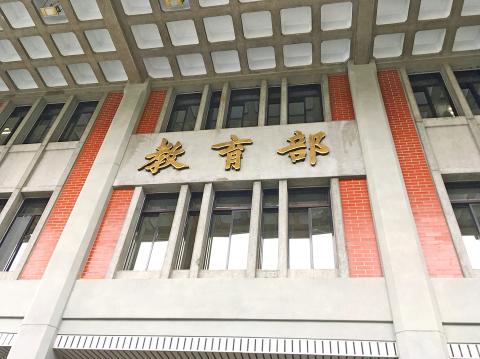The Executive Yuan has formed a task force to investigate academics suspected of breaching cross-strait laws by taking part in China’s Thousand Talents Plan, Minister of Education Pan Wen-chung (潘文忠) said yesterday.
The government would not restrict any cross-strait educational exchanges, but such exchanges should be conducted in an equal and reciprocal manner, and according to the Act Governing Relations Between the People of the Taiwan Area and the Mainland Area (臺灣地區與大陸地區人民關係條例), he said.
Taiwanese academics could break the law if they attend events that promote unification under the pretense of enhancing educational exchanges, he said.

Photo: Rachel Lin, Taipei Times
To prevent people from becoming prey to China’s “united front” tactics, the government would improve efforts to remind people to avoid cross-strait exchanges with political agendas, he said.
While 33 Taiwanese, including several retired teachers and six to seven professors and researchers, are said to have joined the program, Pan said the government is still investigating whether the allegations are true.
To counter China’s attempts to recruit Taiwanese talent and obtain Taiwanese technologies through the program and other state-funded research initiatives, the ministry has been planning to tighten regulations on cross-strait partnerships.
It drafted amendments to regulations to require universities to notify the ministry before launching partnerships or holding exchanges involving a political agenda with Chinese schools.
According to Article 33-1 of the act, unless approved by the ministry, universities and their employees cannot collaborate with Chinese individuals or organizations on political issues or matters that could affect national security, or jointly establish organizations for political purposes.
Participating in the program could contravene the article.
Amid rumors that Chinese universities allow Taiwanese public university professors to take part-time positions under assumed names to avoid repercussions in Taiwan, Department of International and Cross-strait Education Director-General Bi Tzu-an (畢祖安) said that anyone doing so would still contravene the law, as such university professors are banned from taking part-time positions.
When Taiwanese academics visit Chinese universities to give speeches, the host universities sometimes claim that they are honorary professors at the institution, he said, urging academics to watch out for such situations.

INVESTIGATION: The case is the latest instance of a DPP figure being implicated in an espionage network accused of allegedly leaking information to Chinese intelligence Democratic Progressive Party (DPP) member Ho Jen-chieh (何仁傑) was detained and held incommunicado yesterday on suspicion of spying for China during his tenure as assistant to then-minister of foreign affairs Joseph Wu (吳釗燮). The Taipei District Prosecutors’ Office said Ho was implicated during its investigation into alleged spying activities by former Presidential Office consultant Wu Shang-yu (吳尚雨). Prosecutors said there is reason to believe Ho breached the National Security Act (國家安全法) by leaking classified Ministry of Foreign Affairs information to Chinese intelligence. Following interrogation, prosecutors petitioned the Taipei District Court to detain Ho, citing concerns over potential collusion or tampering of evidence. The

‘FORM OF PROTEST’: The German Institute Taipei said it was ‘shocked’ to see Nazi symbolism used in connection with political aims as it condemned the incident Sung Chien-liang (宋建樑), who led efforts to recall Democratic Progressive Party (DPP) Legislator Lee Kun-cheng (李坤城), was released on bail of NT$80,000 yesterday amid an outcry over a Nazi armband he wore to questioning the night before. Sung arrived at the New Taipei City District Prosecutors’ Office for questioning in a recall petition forgery case on Tuesday night wearing a red armband bearing a swastika, carrying a copy of Adolf Hitler’s Mein Kampf and giving a Nazi salute. Sung left the building at 1:15am without the armband and apparently covering the book with a coat. This is a serious international scandal and Chinese

Seventy percent of middle and elementary schools now conduct English classes entirely in English, the Ministry of Education said, as it encourages schools nationwide to adopt this practice Minister of Education (MOE) Cheng Ying-yao (鄭英耀) is scheduled to present a report on the government’s bilingual education policy to the Legislative Yuan’s Education and Culture Committee today. The report would outline strategies aimed at expanding access to education, reducing regional disparities and improving talent cultivation. Implementation of bilingual education policies has varied across local governments, occasionally drawing public criticism. For example, some schools have required teachers of non-English subjects to pass English proficiency

TRADE: The premier pledged safeguards on ‘Made in Taiwan’ labeling, anti-dumping measures and stricter export controls to strengthen its position in trade talks Products labeled “made in Taiwan” must be genuinely made in Taiwan, Premier Cho Jung-tai (卓榮泰) said yesterday, vowing to enforce strict safeguards against “origin laundering” and initiate anti-dumping investigations to prevent China dumping its products in Taiwan. Cho made the remarks in a discussion session with representatives from industries in Kaohsiung. In response to the US government’s recent announcement of “reciprocal” tariffs on its trading partners, President William Lai (賴清德) and Cho last week began a series of consultations with industry leaders nationwide to gather feedback and address concerns. Taiwanese and US officials held a videoconference on Friday evening to discuss the